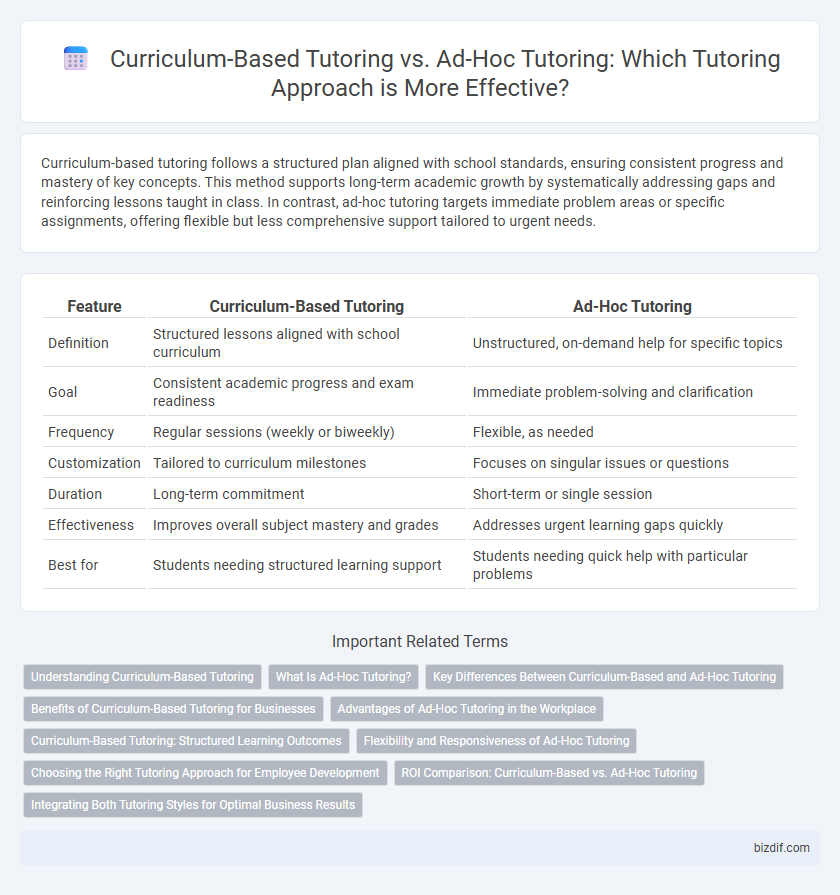Curriculum-based tutoring follows a structured plan aligned with school standards, ensuring consistent progress and mastery of key concepts. This method supports long-term academic growth by systematically addressing gaps and reinforcing lessons taught in class. In contrast, ad-hoc tutoring targets immediate problem areas or specific assignments, offering flexible but less comprehensive support tailored to urgent needs.
Table of Comparison
| Feature | Curriculum-Based Tutoring | Ad-Hoc Tutoring |
|---|---|---|
| Definition | Structured lessons aligned with school curriculum | Unstructured, on-demand help for specific topics |
| Goal | Consistent academic progress and exam readiness | Immediate problem-solving and clarification |
| Frequency | Regular sessions (weekly or biweekly) | Flexible, as needed |
| Customization | Tailored to curriculum milestones | Focuses on singular issues or questions |
| Duration | Long-term commitment | Short-term or single session |
| Effectiveness | Improves overall subject mastery and grades | Addresses urgent learning gaps quickly |
| Best for | Students needing structured learning support | Students needing quick help with particular problems |
Understanding Curriculum-Based Tutoring
Curriculum-based tutoring aligns directly with school standards and learning objectives, providing structured support tailored to the student's current coursework, which enhances retention and performance on standardized assessments. This method uses targeted content designed to fill specific knowledge gaps and reinforces concepts covered in the classroom, promoting consistent academic progression. By synchronizing tutoring sessions with the curriculum, students gain a coherent learning experience that builds foundational skills necessary for long-term success.
What Is Ad-Hoc Tutoring?
Ad-hoc tutoring refers to spontaneous, needs-based instruction tailored to address immediate academic challenges or questions without following a structured curriculum. It allows for flexible scheduling and personalized support, ideal for students requiring help with specific topics or assignments. Unlike curriculum-based tutoring, ad-hoc sessions prioritize quick problem-solving and targeted skill reinforcement over long-term academic planning.
Key Differences Between Curriculum-Based and Ad-Hoc Tutoring
Curriculum-based tutoring follows a structured, syllabus-aligned approach designed to reinforce school lessons and ensure mastery of specific academic standards. Ad-hoc tutoring, by contrast, offers flexible, personalized sessions targeting immediate learning gaps or specific problem areas without a predefined scope. Curriculum-based tutoring emphasizes consistent progress tracking and comprehensive skill development, while ad-hoc tutoring prioritizes quick, solution-focused interventions.
Benefits of Curriculum-Based Tutoring for Businesses
Curriculum-based tutoring offers businesses a structured approach to skill development, ensuring consistent learning outcomes aligned with company goals and industry standards. This method allows for scalable employee training programs, improving overall workforce competency and productivity. By integrating curriculum-based tutoring, businesses can track progress efficiently and tailor instruction to address specific knowledge gaps, resulting in higher return on investment compared to ad-hoc tutoring sessions.
Advantages of Ad-Hoc Tutoring in the Workplace
Ad-hoc tutoring in the workplace offers flexibility by addressing immediate skill gaps without adhering to a fixed curriculum, enabling personalized learning aligned with specific job tasks. This approach promotes rapid problem-solving and enhances employee productivity by targeting real-time challenges. Employers benefit from cost-efficiency and adaptability, optimizing training resources to meet dynamic business needs.
Curriculum-Based Tutoring: Structured Learning Outcomes
Curriculum-based tutoring aligns with standardized educational goals, ensuring consistent progress through a well-defined syllabus tailored to grade-level expectations. This structured approach facilitates targeted skill development and measurable academic achievement, enhancing student confidence and mastery. By following a coherent sequence of lessons, curriculum-based tutoring supports long-term retention and prepares students for standardized assessments effectively.
Flexibility and Responsiveness of Ad-Hoc Tutoring
Ad-hoc tutoring offers unmatched flexibility by adapting sessions to the student's immediate questions and evolving needs, unlike curriculum-based tutoring which follows a fixed syllabus. This responsiveness allows tutors to address specific problem areas as they arise, fostering a personalized learning experience that can quickly fill knowledge gaps. Real-time adjustment in ad-hoc tutoring supports dynamic learning progression, enhancing engagement and retention for varied learning styles.
Choosing the Right Tutoring Approach for Employee Development
Choosing the right tutoring approach for employee development hinges on aligning methods with learning objectives; curriculum-based tutoring offers structured, comprehensive skill-building through a predefined syllabus, ideal for developing specific competencies over time. In contrast, ad-hoc tutoring provides flexible, targeted support for immediate problem-solving or skill gaps, making it suitable for addressing urgent workplace challenges. Evaluating organizational goals, employee learning styles, and performance needs ensures the selection of an effective tutoring strategy that drives measurable progress and enhances workforce capability.
ROI Comparison: Curriculum-Based vs. Ad-Hoc Tutoring
Curriculum-based tutoring delivers a higher ROI by aligning sessions with established academic standards and learning objectives, ensuring consistent progress and long-term skill retention. Ad-hoc tutoring offers flexibility for immediate problem-solving but often lacks continuity, leading to less measurable improvements and lower overall academic gains. Investing in curriculum-based tutoring maximizes value through structured lesson plans, progress tracking, and targeted reinforcement, resulting in more efficient use of time and resources.
Integrating Both Tutoring Styles for Optimal Business Results
Integrating curriculum-based tutoring with ad-hoc tutoring enhances personalized learning by aligning structured lesson plans with flexible, on-demand support tailored to individual student needs. Businesses benefit from this hybrid approach by expanding service offerings, increasing client retention through continuous progress tracking, and adapting to diverse learning preferences. Leveraging data analytics from both tutoring styles allows for targeted improvements and scalable growth in educational outcomes.
curriculum-based tutoring vs ad-hoc tutoring Infographic

 bizdif.com
bizdif.com